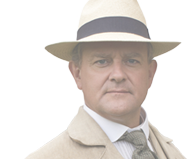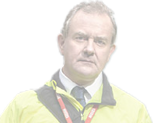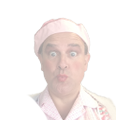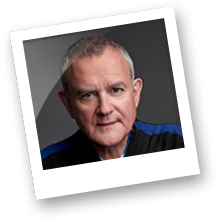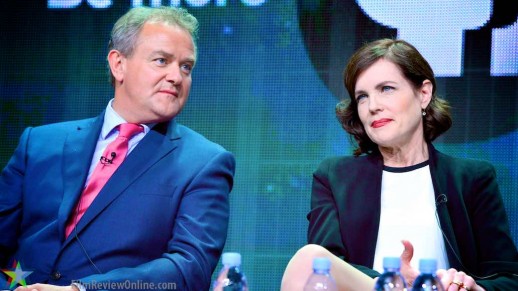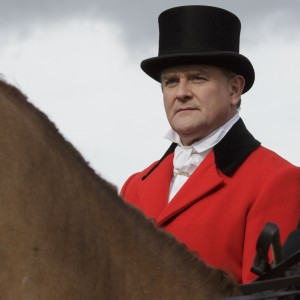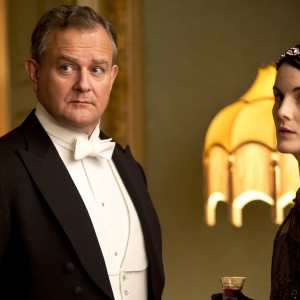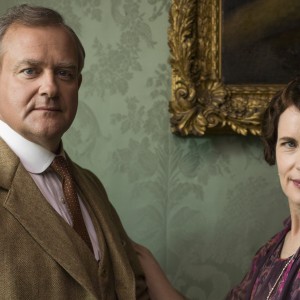Article by Judy Sloane for Film Review Online
It has already ended in England, and soon it will be ending here too. The very last episode of Downton Abbey, created by Julian Fellows, played on British TV on Christmas Day. The first episode of the final season, which takes place in the 1920s, premieres here in the States on January 3rd 2016.
Yes, it’s almost time for us, in the US, to say goodbye to the aristocratic Crawley family and their devoted servants.
Hugh Bonneville, who portrays Robert Crawley, Earl of Grantham, and Elizabeth McGovern, who plays his wife Cora Crawley, Countess of Grantham, joined the journalists at the TV Critics Association last summer to talk about the conclusion of one of the most popular television series ever produced.
What do you miss about the time that you were transported to for six years?
Elizabeth: I miss the peace of it, the fact that in today’s world we’re so inundated with information all the time and with stuff we don’t really need to know. With so many choices we have to make, so much opportunity is seemingly at our fingertips, and it’s really more than we can really process.
But in the world of Downton Abbey, we all only know the circle that is right in front of our face, and we know our job, and we know our place and we know how to behave. And there are limits to that life, of course, but it’s peaceful.
Hugh: I’m not sure about missing it, but the one thing I’ve learnt from the show is that only the people who smoke cigarettes are up to no good.
Did you know the first day of shooting the series that it was special?
Elizabeth: I knew I loved it. That’s all any of us ever really can go by. But the first day when we all sat round a big table in a drafty room, I think it was in Ealing, and we had a reading, something happened in that reading.
In that hour and a half that we sat round that table, there was a TV show suddenly that was [evolving] and you just forgot that you were nervous about reading your part.
There was a story that was being created. And on that day, I knew that it was going to be something special.
Hugh, your character, Robert, is the one whose entire way of life has been under attack from the very first episode. What do you think of him and the struggle he’s gone through from the beginning of the series?
Hugh: His sole purpose in life is to hand on the estate in the best possible condition to the next generation.
That’s his job. That’s his destiny. And there are times, sometimes through his own folly, that’s at risk.
This final season very much has a flavor of the end of an era, quite literally. And it’s brought home to us when we go to visit a neighbor in the county who is literally having to sell the family silver. He’s selling everything. We go to see that once grand estate being fragmented.
The entire family sees that and sees the writing is on the wall. You adapt or die. And I think Robert, yes, dinosaur that he has been at times, ultimately, whether he’s dragged kicking and screaming by Mary, or by his mother or by Cora, does see the changes necessary.
He wants to conserve the best of the past, but absolutely understands that the future beckons. The question in this series is, do they succeed?
If you could sum up Julian Fellows in a word or two, what would you say about him?
Hugh: I think as a man and as a writer, his view on life is that people have tried to be fundamentally good. They may do bad things, but he writes from a position that human nature tries to do good. And I think that comes across in all the characters.
Even Thomas, who you may love to hate, you begin to understand him and you understand why he does bad actions or he’s up to mischief. And I think that characterizes all of the writing, really, and all of the spirit of him as a man as well. He sees the best in people.
Elizabeth: He’s someone who has an uncanny instinct for gleaning all the bits of you that you don’t think are obvious, and pulling them out of you in this characterization. It’s a remarkable thing to experience over the course of six years.
All those things about yourself that you think are quite hidden and deep down, you suddenly see reflected back in the writing of this script in some subtle way, and you think, how did he pick up on this?
Because there’s so little actual dialogue between him and the actors in the process of writing, and yet you feel there’s a constant unspoken communication when you read the storylines that it’s just mysterious to me.
What do you have coming up after Downton?
Hugh: The day after we finish, I’m going to India to start work on a movie called The Viceroy’s House, which is about the partition of India in 1947. I’m playing Lord Mountbatten and Gillian Anderson is playing Lady Mountbatten.
Elizabeth: Looking for a job!



